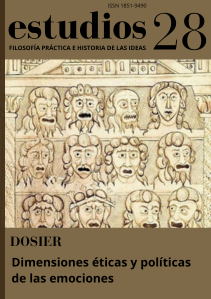Herbert Marcuse and Enrique Dussel: Theoretical-Methodological Notes for Thinking about an Erotics in a Political Key
Keywords:
Erotics , Marcuse, Dussel, Psychoanalysis, PoliticsAbstract
In the framework of this work, we intend to address concepts and problems based on some theses of H. Marcuse and E. Dussel regarding erotics. Both thinkers, in the second half of the 20th century, focus on rethinking psychoanalytic categories to develop an erotics that does justice to its historical dimension. For them, it is not merely a private aspect of human existence but constitutes a dimension that expresses relationships of domination that permeate concrete and historical societies. Desire, the pursuit of pleasure, bonds between people, one's own body, and that of others become theoretical keys to criticize society as a whole and the domination present within it, but also to consider alternatives that imply the liberation from oppression. Marcuse asserts that it is precisely the repression of libido that is one of the main mechanisms of domination in contemporary societies. On the other hand, Dussel devotes a section of his system to erotics, defining it as the practical relationship between man and woman. However, the way this bond between the sexes is exercised is historical and, within the framework of Western history, marked by the domination and oppression of women.
References
Dussel, E. (1980). Filosofía de la liberación. Universidad Santo Tomás, Centro de enseñanza desescolarizada.
Dussel, E. (1990). Liberación de la mujer y erótica latinoamericana. Editorial Nueva América.
Dussel, E. (2016). Para una erótica latinoamericana. Fundación Editorial El perro y la rana.
Freud, S. (1992). Obras completas. Volumen 21 (1927-31), El porvenir de una ilusión, El malestar en la cultura y otras obras. Amorrortu Editores.
Marcuse, H. (1985). Eros y Civilización. Editorial Planeta- De Agostini Edición.
Marcuse, H. (1970). El anticuamiento del psicoanálisis. Ética de la revolución. Taurus.
Robert, J. (2006). Herbert Marcuse: Sexualidad y psicoanálisis. Revista Filosofía Universidad de Costa Rica, XLIV (111-112), 153-163. https://archivo.revistas.ucr.ac.cr/index.php/filosofia/article/view/7438
San Pedro, C. (2013) ¿Liberación erótica o prescripción de sujetos y deseos? Intersticios De La política Y La Cultura. Intervenciones Latinoamericanas, 2(3), 97–104. https://revistas.unc.edu.ar/index.php/intersticios/article/view/5368
Sánchez, G. E. (2024). Acerca del método anadialéctico de Enrique Dussel: alteridad y revelación. Cuyo. Anuario de Filosofía Argentina y Americana, 44, 249–273. https://revistas.uncu.edu.ar/ojs3/index.php/anuariocuyo/article/view/7985
Downloads
Published
Issue
Section
License
Copyright (c) 2025 Betina Vazquez GadadiLicencia CreativeCommons (CC BY-NC-SA 2.5 AR) - creativecommons.org/licenses/by-nc-sa/2.5/ar/
Usted es libre de:
- Compartir — copiar y redistribuir el material en cualquier medio o formato
- Adaptar — remezclar, transformar y construir a partir del material
- La licenciante no puede revocar estas libertades en tanto usted siga los términos de la licencia
Bajo los siguientes términos:
- Atribución — Usted debe dar crédito de manera adecuada , brindar un enlace a la licencia, e indicar si se han realizado cambios . Puede hacerlo en cualquier forma razonable, pero no de forma tal que sugiera que usted o su uso tienen el apoyo de la licenciante.
- NoComercial — Usted no puede hacer uso del material con propósitos comerciales .
- CompartirIgual — Si remezcla, transforma o crea a partir del material, debe distribuir su contribución bajo la la misma licencia del original.
- No hay restricciones adicionales — No puede aplicar términos legales ni medidas tecnológicas que restrinjan legalmente a otras a hacer cualquier uso permitido por la licencia.
Avisos:
No tiene que cumplir con la licencia para elementos del material en el dominio público o cuando su uso esté permitido por una excepción o limitación aplicable.









